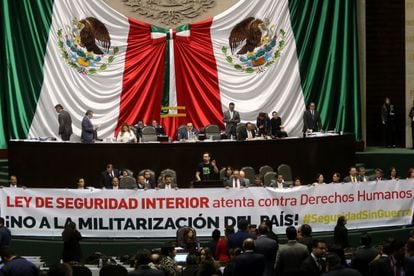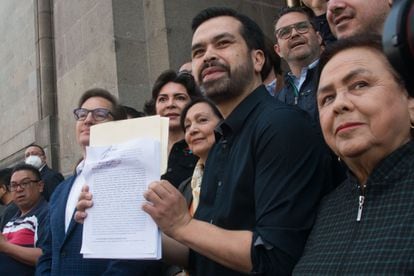Samuel Garcia. Luis Donaldo Colosio Riojas. Marcelo Ebrard. Patricia Mercado. Enrique Alfaro. Dante Delgado. In recent months, rivers of ink have flowed to try to guess who was going to be the Citizen Movement (MC) candidate for the presidency in the 2024 elections. The name of Jorge Álvarez Máynez was not in many of the pools, nor did it sound in the forecasts nor did it appear in the surveys. The orange party in the end opted for the leader of its bench in the Chamber of Deputies to measure forces with the ruling party Claudia Sheinbaum and with Xóchitl Gálvez, her main pursuer. The person in charge of putting an end to the mystery was Samuel García himself, who released a video to hand over the baton to Álvarez Máynez as a reliever in the longest presidential race in history. It was a “warm up, get on the field.” MC removed his most solvent deputy from the bench to give him a new mission: no longer as a campaign coordinator, no longer as a political operator, no longer as the voice of the party against the anticipated acts of his rivals, but as the protagonist, “the new”, the most “phospho of everyone.” The ballot is complete for next June's voting with a contender who arrived by surprise and at the last minute.
The first obstacle in Álvarez Máynez's path has been having to deal with comparisons, like any substitute. It was Samuel García who raised his hand, but also the one who had already occupied the role of sole pre-candidate. His reliever will have to see if he fits into the suit originally designed for the governor of Nuevo León or if he will have to make adjustments. A man of all the trust of the leadership and with specific weight behind closed doors, the most obvious criticism about “the new one” is that he is a much less known profile than that of his predecessor.
As an example, few newspapers dedicated their front pages this Wednesday to the appointment made by Dante Delgado's party. The main news programs made a brief, glancing mention, after an extensive review of the national and international agenda. His rivals did not miss the opportunity to attack that weak point. “We already won!” Alejandro celebrated. Alito Moreno, the national leader of the Institutional Revolutionary Party (PRI), upon learning that he was MC's chosen one. There was also friendly fire. Enrique Alfaro, governor of Jalisco and convinced that other opposition forces had to be joined to defeat Morena, did not hold anything back when saying that his party was making a mistake by “imposing” Álvarez Máynez. “If that is the path they want to take, that's up to them,” he concluded on his social networks.
Álvarez Máynez is not new to the campaign. When the president, Andrés Manuel López Obrador, took the baton to establish the rules of succession last June, the MC deputy came out to denounce that his rivals wanted to take “five months of illegal advantage” regarding the deadlines he dictates. the law. The 38-year-old legislator was right, but when the electoral authorities preferred to look the other way to avoid getting into trouble and when the PAN, the PRI and the PRD decided to go ahead as well, the battle became quixotic. The campaign that was not a campaign, with rallies labeled as “party assemblies” and candidates disguised as “coordinators,” continued as if nothing had happened.
Movimiento Ciudadano was the only registered party that waited until the end of 2023 to move its chips, partly as a declaration of intent to distance itself from “the old politics,” partly to keep its options open. The strong men of the party had several challenges to decide whether to join the opposition front, whether to bet on Ebrard's external candidacy or whether they finally dared to go alone for the first time and with their own candidate in a presidential election.
Álvarez Máynez always had a place at the table alongside Delgado, García, Senator Clemente Castañeda and, at first, Alfaro. From the beginning, he seemed more comfortable in the role of strategist or squire, but always behind the scenes. In November, Ebrard's option fell through, Samuel García came forward and Álvarez Máynez was named campaign coordinator, a position that lasted less than two weeks until the governor of Nuevo León had to step aside to extinguish the political crisis. that shook his State in the first week of December.
“In just 10 days, Movimiento Ciudadano sent PRIAN to second place,” Álvarez Máynez is seen saying in a spot which MC launched on December 27, still as national coordinator, without anyone suspecting that he would take a step forward. He was revealed this week, practically a month after García's shipwreck. “He is the best presidential candidate that MC could have and starting June 2, Mexico will have in you a great president of the Republic,” said Delgado when making his registration official.

Álvarez Máynez has known how to embody the contradictions that have accompanied MC in its short history: its programmatic face and its marketing commitment. He is the young politician who opposes in Congress militarization and the attack on the autonomous bodies of this Government; the one who fights in the National Electoral Institute to denounce cheating and bungling by his rivals, the one who has said time and again that “with the PRI there is no way around.” But he is also the one who was a member of the PRI for three years, the one who agrees to let García uncover him with chips and beer in hand, the one who doesn't make faces when they tell him that the speech has to be Light or that the political message that must be positioned is to put on your tennis shoes phospho phospho. The now pre-candidate, in fact, adds in his official profile that he was a key figure to add to profiles such as that of Governor García and his wife, Mariana Rodríguez, or Salomón Chertorivsky,
also criticized for having worked with PRI Administrations and bread.
With a degree in International Relations and two master's degrees in Constitutional Law and Human Rights and in Public Administration, he began his political career as councilor of Zacatecas, his homeland, in 2004, while he was still studying at university. Part of a left-wing family, his father was the founder of the Communist Party, he was the founding director of the newspaper The Day in Aguascalientes and was first active in the Party of the Democratic Revolution (PRD). In 2009 he left that political institute and a year later he had a brief stint with the defunct Nueva Alianza, which nominated him as a local deputy for Zacatecas in coalition with the Green Party and the PRI, which supported him in its ranks from 2010 to 2013. Typical of the paradoxes of Mexican politics, the PRI has not hesitated to rub its PRI past to detract from its credibility. “Imagine the shame for him: criticizing the PRI and he was a PRI deputy,” he declared. Alito Moreno last May.
In 2013 he joined Movimiento Ciudadano, with the task of building a territorial structure and giving its own identity to a party that had just changed its name two years before and could not shake off the label of López Obrador's satellite. In 2015, he arrived as a federal deputy, reconfigured as a harsh critic of the PRI during the Government of Enrique Peña Nieto and later, of the legislative alliances between Morena and the PRI to advance López Obrador's priority initiatives. In this Administration, he opposed the president's so-called plan B, questioned the management of the pandemic and rejected the electrical reform promoted by the ruling party.

“Our fight is not for the next election, we understand that the country is not going to change by removing this president and installing another. Our fight is to change the system,” he says in his Blog personal, where he cites Bernie Sanders, Alexandra Ocasio, Gabriel Boric and Iñigo Errejón among his political influences, as well as Dante Delgado and Patricia Mercado, his coreligionists. The last candidate to join the presidential race arrives with the advantage of an eventful internal process and of being a little-known face, but he has room to be an uncomfortable rival, agile in the debate and who can speak to him, for reasons of substance and of way, to the young electorate: he is 20 years younger than his rivals. But for that he will have to dare to find his own voice. He goes against time and skepticism, driven by Delgado and García, with the promise of building a third way that has not arrived. In the end, it will be a three-way battle that will be decided at the polls.
Subscribe here to the EL PAÍS México newsletter and receive all the key information on current events in this country
Subscribe to continue reading
Read without limits
_
#Jorge #Álvarez #Máynez #candidate #expected #presidential #ballot

